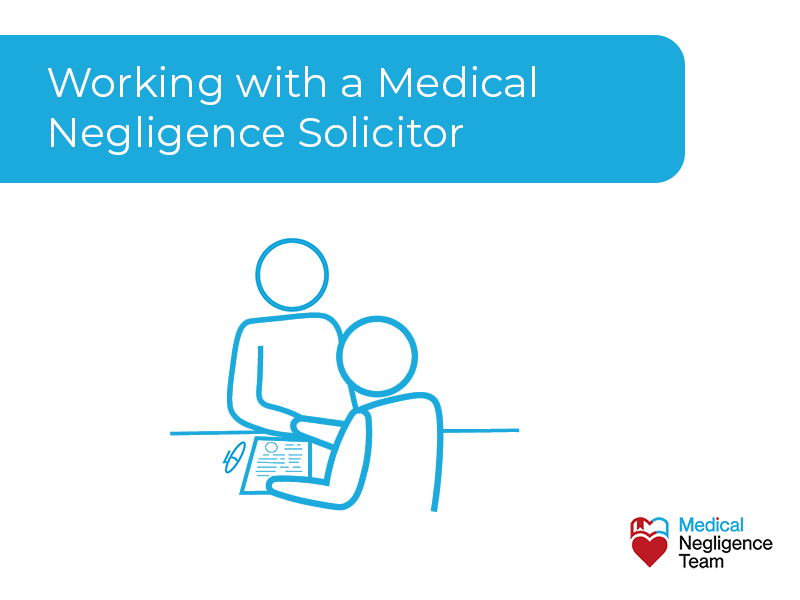Care home negligence happens all the time. You trust a loved one to a care home, believing they will be cared for with respect and professional attention.
Unfortunately, often the opposite is true and care home negligence causes harm to your spouse, long term partner, mother, father or grandparent.
People who need to live in a care home facility cannot look after themselves. They need care beyond what their relatives can provide.
Your loved ones are vulnerable and need protection. A care home will have nursing supervision meaning a high standard of care should be expected.
There are many reasons behind care home negligence, from understaffing to overcrowding.
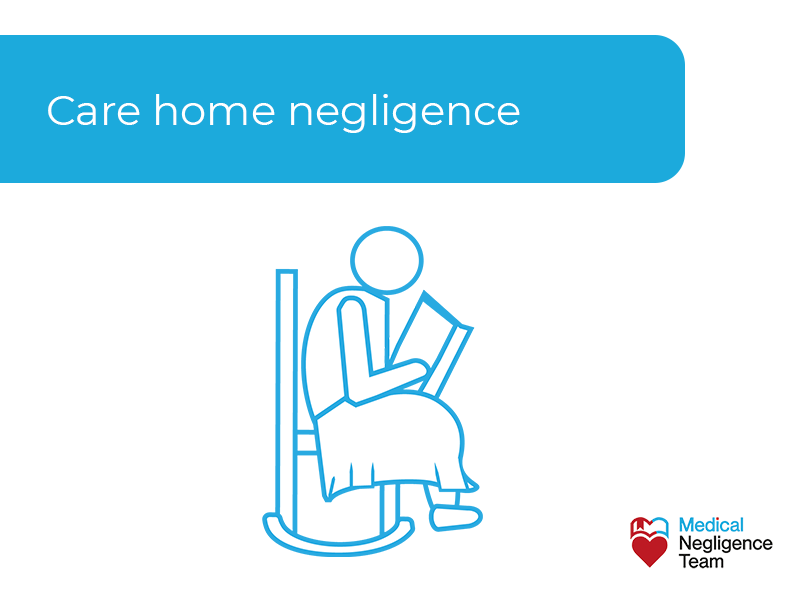
What is important is that your loved one receives compensation for the care home negligence, which should never happen to one so vulnerable.
The Medical Negligence Team fights your compensation claim for care home negligence.
We have the legal and medical experts to form your case and get the compensation your loved one deserves.
Table of content
What is care home negligence?
Care home negligence is when the care provided by a care home facility is below acceptable standards. It is care that is so poor no other care home acting professionally would provide such service.
Patients in a care facility come to harm due to care home negligence. It could be a fall when they go to the bathroom unassisted, bed sores from not being cared for properly or even missed signs of infection leading to serious illness.
Whatever type of care home negligence your loved one suffered, there is no excuse for it. The trust you put in the care home and the staff to look after your loved one should not be abused.
It is the care home’s responsibility to provide acceptable and professional care. The care home negligence may not be obvious.
Negligence often occurs over time, and one incident may bring a lot of the care home negligence to light.
What is important is to be aware of care home negligence and the different types of it patients can experience.
What are common types of care home negligence?
Common types of care home negligence range from falls when unassisted to lack of care for people living with dementia and Alzheimer’s.
If your loved one comes to harm in a care home, it is very likely due to care home negligence.
Common types of care home negligence are:
Each type of care home negligence means a patient, your loved one, is being put in danger, and this should not happen.
Falls when unassisted negligence
Falls when unassisted negligence is when a patient slips or falls when walking, getting out of bed or standing up unaided. A fall when unassisted, leaves the patient very vulnerable to sprains, cuts and bruises and broken bones.
A care home should provide the required support as per the care plan to every patient when they need to move around the facility, and failure to follow that plan falls when unassisted negligence occurs.
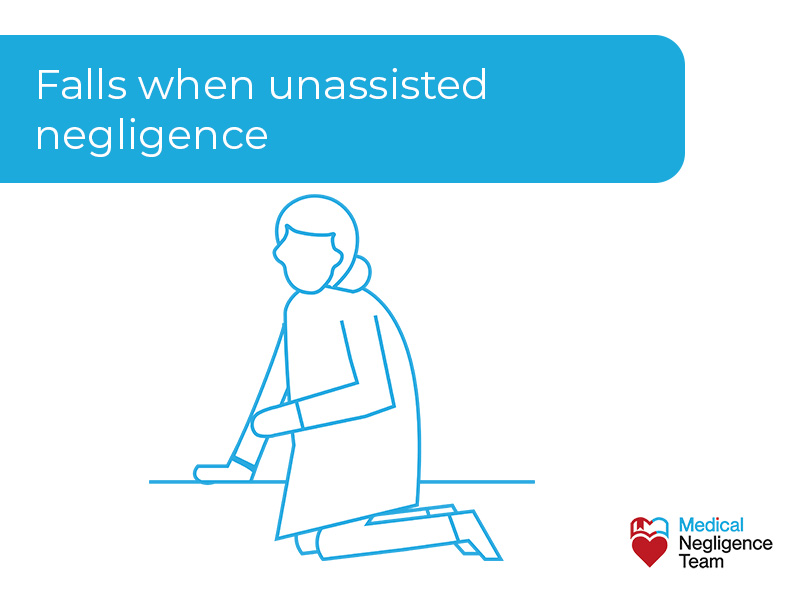
Bed sores from not being turned negligence
Bed sores from not being turned negligence are when a patient develops ulcers and bed sores when bedbound. A bed-bound patient cannot turn or move around the bed without assistance and must be turned regularly. This is known as repositioning.
The care home is responsible for ensuring the patient is moved about their bed during the day. Bed sores are painful sores which can get infected but need not happen if proper care is provided.
As well as regular repositioning the care home must have the appropriate pressure relief adaptations in place such as air mattresses on the bed and air cushions when the patient is sat out of bed.
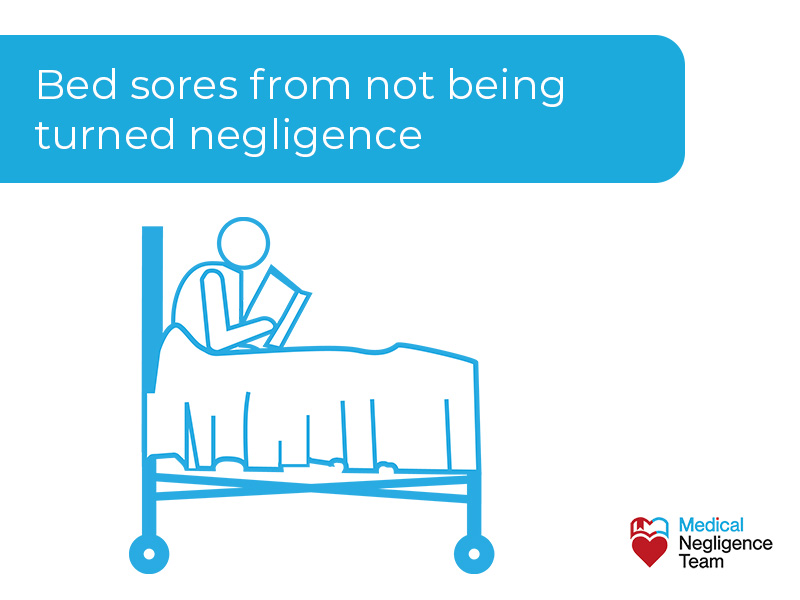
Not referring for further treatment negligence
Not referring for further treatment negligence is when an ill care home resident is not attended by a doctor or sent to hospital if necessary.
Many care homes do not provide 24-hour medical attention by a doctor. It is the duty of staff to recognise when a patient may need professional medical attention.
Sending a patient to hospital who is very ill should happen as soon as possible. When the patient is not referred for further treatment, it is medical negligence, and the care home is responsible.
Patients left unattended negligence
Patients left unattended negligence is when care home staff do not provide regular care to your loved one. They may get the patient out of bed in the morning but then leave them in an armchair for the day.
When patients are left unattended, they slip out of the carer’s mind. Medicines are forgotten, meals are not eaten, and dehydration happens from lack of liquids. Bed sores, blocked catheters, falls, and other accidents follow from the patient being left unattended.
The patient must be attended to in a care home throughout the day. It is care home negligence when a resident is left unattended.
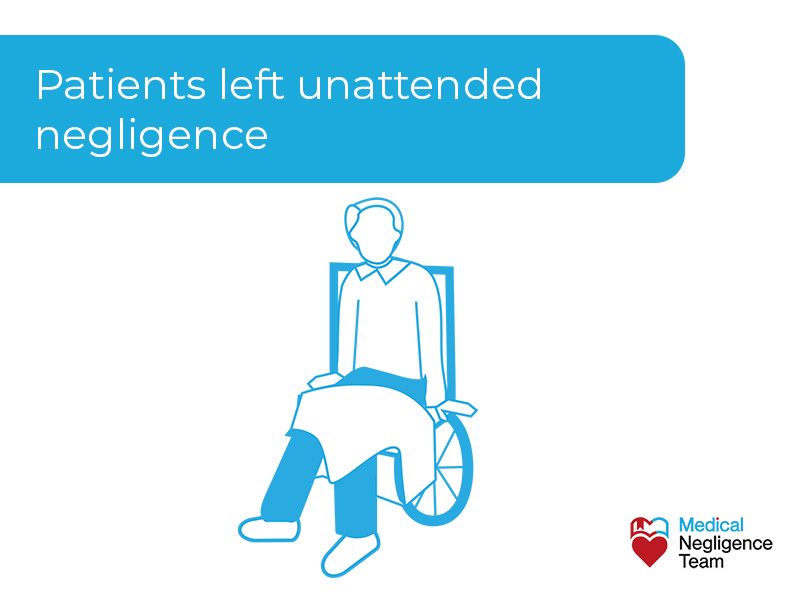
Staff not reacting to an emergency negligence
Staff not reacting to an emergency negligence situation is when a patient is left for too long in a medical emergency situation.
A patient may wake in distress during the night and call for help, but the skeleton staff on duty do not react in time. Your loved one may be having a stroke, heart attack or kidney failure from a malfunctioning catheter and is left to suffer.
Medical complications are part of every day in a care home. For staff not to react to a medical emergency is care home negligence.
Dementia and Alzheimer’s negligence
Dementia and Alzheimer’s negligence is when a patient with such conditions is not given due care. Patients with Dementia or Alzheimer’s cannot care for themselves and will need full-time care when in a residential facility.
A person living with dementia or Alzheimer’s will become confused. They may walk out of the care home looking for a loved one, harming themselves in the process.
The patient may not be able to do day-to-day tasks such as using the bathroom and will need the care to do so.
Neglecting a resident with dementia or Alzheimer’s is serious care home negligence.
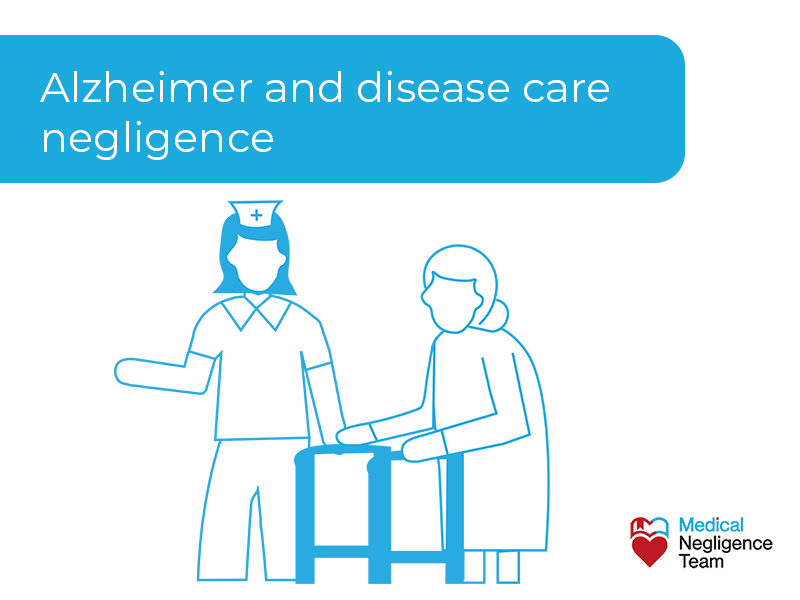
Medications not being given negligence
Medications not being given negligence is when care home staff fail to give a resident their medicines as prescribed. Any ill person needs their medications, and failure to give them has serious consequences.
It can be the staff providing the medicine container but do not check if the patient took them. Nursing staff may forget to give your loved one their daily medications or only give them some of what is prescribed.
Giving the wrong medications to a patient or the incorrect dose of a medication can also happen.
Medications not being given is care home negligence and a breach of the trust you put in the facility.
Types of care homes that may experience negligence
Types of care homes that may experience negligence are any facility that provides long-term care.
It may be a home for a patient that needs special care when recovering from illness, a disabled relative needing special care or end-of-life care when the time comes for a loved one.
Care homes may be long-term residential settings, recuperation homes or even day-care centres. Negligence can happen at any care home, and it is the patient who will suffer.
Types of care homes that may experience negligence area:
Any facility that provides care outside of a hospital setting is considered a care home. You choose one that suits the needs of your loved one and trust the facility to provide the necessary care.
When a facility does not meet the expected standards and your loved one suffers, it is care home negligence.
Can I claim care home negligence compensation on behalf of a loved one?
You can claim care home negligence compensation on behalf of a loved one. You trusted your relative’s care into the care home’s hands and deserve compensation when they are harmed.
When the owners are responsible for care home negligence, you can claim compensation for your vulnerable relative who cannot do so themselves.
In the eyes of the law, depending on the circumstances there are four persons who can potentially make a claim for care home negligence:
- The resident who is the victim of the care home negligence
- Immediate family members of an incapacitated resident
- The estate of a deceased resident
- Any dependents of a resident who suffered care home negligence
If you are one of the four persons, you can sue for compensation damages through a medical negligence solicitor.
You, or your loved one, sues for two types of compensation damages for care home negligence: General damages and Special damages.
General damages
General damages are when you sue for the pain, suffering and the loss of amenity, PSLA, you have experienced due to care home negligence.
Special damages
Special damages include loss of earnings, future care costs, and out-of-pocket expenses.
Be sure to keep payslips, receipts and proof of any losses experienced as a result of the care home negligence.
When you or a loved one suffers from the effects of care home negligence, you sue for compensation. You deserve the compensation to cover all medical costs and any long-term care needs.
How much can we claim for care home negligence?
You can claim for home care negligence any amount from £1000 to up to £60000 in general damages for common care home claims, depending on the severity of the damage. Obviously in the most severe cases such as amputation of a leg the compensation for general damages can be £150,000 plus special damages to pay for the required care for life.
Every care home negligence case is different, and the circumstances of the negligence can influence the final award in each claim.
Your No Win No Fee medical negligence solicitor will advise you on the amount you may be due and what can decide the claim in your favour.
Typical amounts awarded for common care home negligence compensation claims are:
Amounts such as this are intended as a guide only to the results of negligence and some typical compensation awards.
Your No Win No Fee solicitor will give you a more accurate idea of what amount to expect from your compensation case and guide you through the claims process steps.
The steps involved when suing for care home negligence
The steps involved when suing for care home negligence are a part of any successful compensation claim. When you follow them correctly and get all the facts and figures together, your medical negligence solicitor will do the rest.
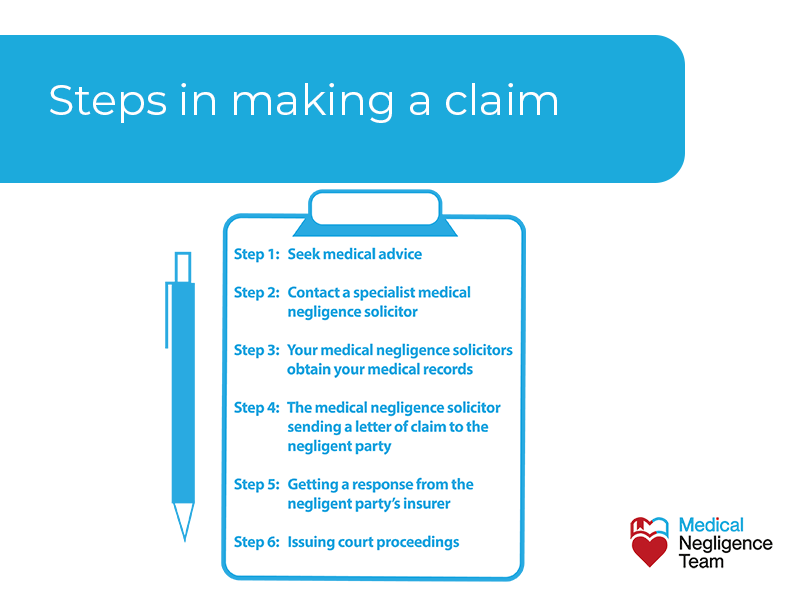
Step 1: Seek medical advice
Seek medical advice on the injuries you or your loved one have suffered or are suffering with immediately you realise the care home negligence.
Step 2: Contact a specialist medical negligence solicitor
Contact a specialist medical negligence solicitor who operates on a No Win No Fee basis and tell them what went wrong. The right solicitor will look at your case, see where the problem lies, and advise if you suffered care home negligence.
The Medical Negligence Team also has a 100% Compensation Guarantee scheme, where you get all the money awarded in a negligence claim.
You or your loved one suffered the care home negligence, and you should get all the money due for the suffering.
Step 3: Your medical negligence solicitor obtains your medical records
Your medical negligence solicitor obtains your medical records with your permission. By reading your records, they will confirm if they think you have a valid care home negligence case.
The medical negligence team will know from reading your medical records if the case will result in care home negligence compensation being paid.
Step 4: The medical negligence solicitor sending a letter of claim to the negligent party
The medical negligence solicitor sending a letter of claim to the negligent party is the next step. The letter will ask them to admit care home negligence in what is known as ‘sending a letter of claim.’
When the negligent party receives the letter of claim, it has up to four months to provide a written response.
Step 5: Getting a response from the negligent party’s insurer
Getting a response from the negligent party’s insurer will move your compensation claim closer to a conclusion.
The insurer will either admit the negligence or say they intend to defend the case. Deciding to defend the case is known as ‘deny liability’ in legal terms.
If they admit liability, your care home negligence claim can be valued.
The two parties will meet to decide on your care home negligence compensation payment.
Your solicitor will negotiate with the negligent party and use their experience to get the compensation you deserve.
Step 6: Issuing court proceedings
Issuing court proceedings is the next step if they deny liability in your care home negligence case. Going to court happens, too, when they are not prepared to pay a fair amount for the injuries you have suffered.
Your medical negligence solicitor issues the court proceedings.
Remember that less than 1% of negligence cases go to trial.
Our Process
Our team members have a higher career win rate with a 75% success rate on NHS letters of claim, compared to an industry average of 54.5%.
Enquiry
The first step is to get in touch and tell us what went wrong. It’s free and easy. Call our 24-hour helpline: 0800 246 1122 or request a callback here.
Medical Evaluation
Once you have spoken with our team we’ll let you know how we can help. Typically the next step is to obtain your medical records for us to review.
Legal Letter
Once all your medical records have been received they will be reviewed by a medically & legally qualified member of our team. If there is evidence of negligence we will send a letter of claim to the negligent party outlining your compensation claim.
Using a No Win No Fee solicitor
Using a No Win No Fee solicitor is the only way to a successful care home negligence claim. Your No Win No Fee medical negligence solicitor will not charge you for a claim you do not win.
If any solicitor starts talking of a ‘win fee’ or a ‘success fee’ from your compensation, you should walk away. The negligent party insurers should pay all legal fees meaning you should get 100% compensation.
The medical negligence solicitor should also operate a 100% Compensation Guarantee scheme. When you win the case, all the money awarded should go to you, not the solicitor.
You or your loved one suffered the care home negligence, and you deserve the compensation to get your life back to normal.
How long do we have to make a claim for care home negligence?
You have three years to make a claim for care home negligence. All medical negligence claims are subject to limitation periods.
For example, in England and Wales, medical negligence claims must generally be brought, court proceedings issued within three years of the injury, or three years of knowledge of the facts giving rise to the claim.
If someone has passed away, the three years would start from the date of death if the limitation period has not already expired at the date of death.
Children not under a disability typically have until they reach 21 to start a care home negligence claim or court proceedings.
Persons under a disability, who lack capacity, are not subject to any limitation period.
Contact The Medical Negligence Team
Contact the Medical Negligence Team today to discuss your care home negligence claim for compensation. We have both the legal and medical experts to guide you along the steps to a successful care home negligence claim for compensation.
At the Medical Negligence Team, we fight every compensation claim on a No Win No Fee basis. You will not be out of pocket for an unsuccessful claim.
We have a very high success rate and a reputation for a speedy and successful resolution to all medical negligence cases.
Our 100% Compensation Guarantee puts all the money you win into your pocket. You or your loved one suffered the care home negligence, and you deserve every penny of the compensation.
Contact us at the Medical Negligence Team for all your medical negligence needs.
